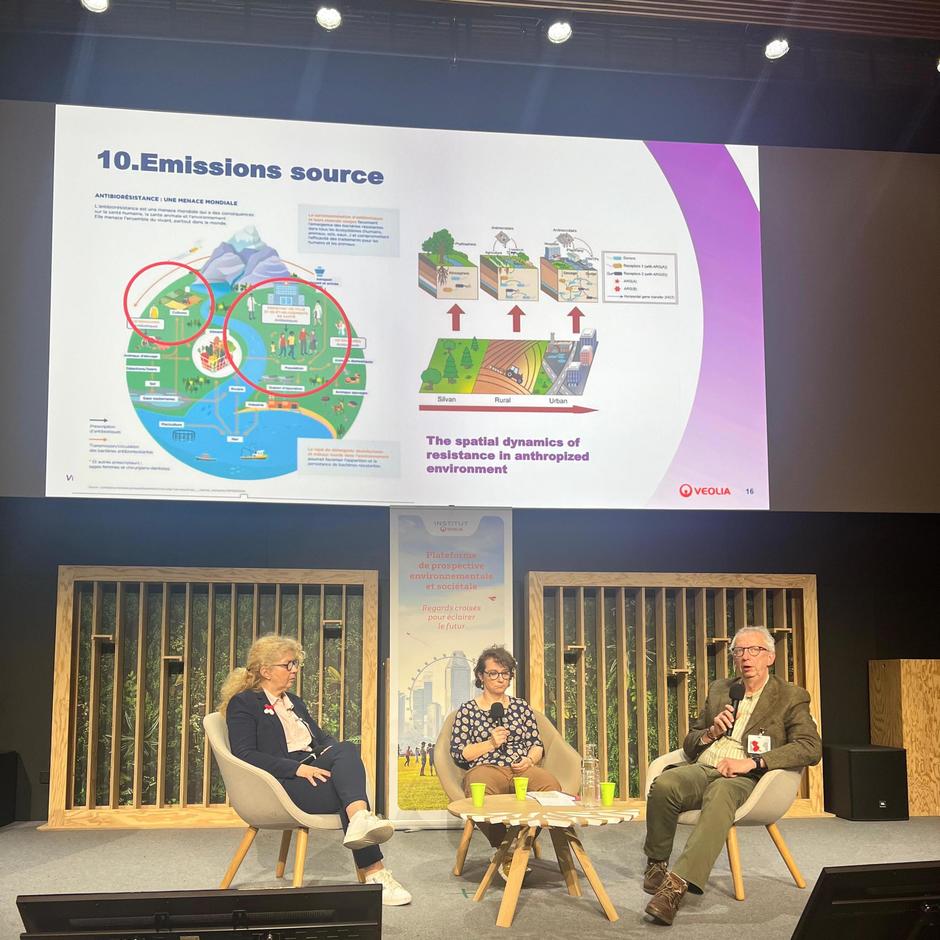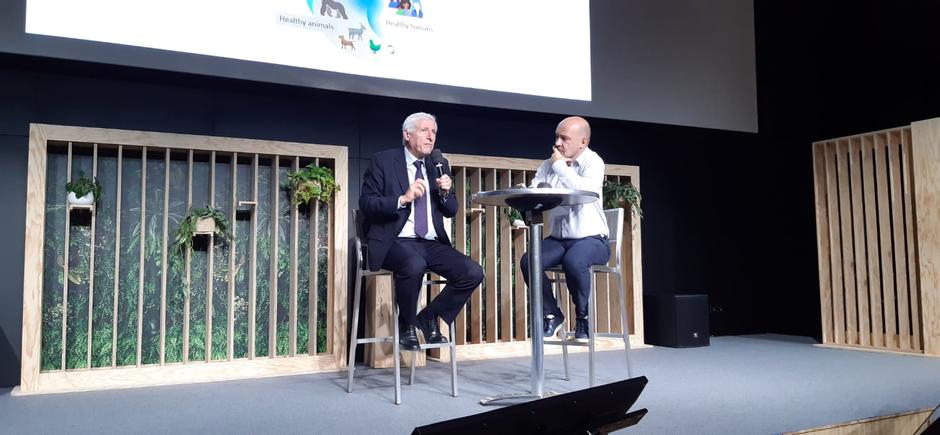In 2018, the Veolia Institute initiated a new format of meetings for Veolia managers to explore the environmental, societal and geopolitical changes underway through dialogue with high-level experts. Short video interviews are used to relay the key messages of these meetings to a wider audience.
> Antibiotic resistance 💊
May 2024
A second scientific talk between the Veolia Institute and DEST.
Professors Marie-Cécile Ploy and Christophe Dagot shared their knowledge of antibiotic resistance, a global threat causing more than a million deaths every year. Together with Charlotte Arnal, an expert in environmental microbiology, they discussed the challenges and the need for a coordinated approach between the human, animal and environmental health sectors.
> The economic and social impact of Artificial Intelligence
April 2024
Philippe Aghion, an economist specialising in the economics of innovation and growth, Professor at the Collège de France, INSEAD and the London School of Economics and Political Science (LSE), shared his expertise. He also co-chairs the Commission on Artificial Intelligence, which recently submitted a report to the French President.
He discussed the economic and social impacts of Artificial Intelligence (AI), in particular its effects on employment, productivity and inequality. This presentation provided a better understanding of the challenges and opportunities that AI presents for our society and our economy. In particular, it is essential to ‘de-demonise AI, without idealising it’.

> Preview of the CyclOpe 2024 Report ‘Waiting and hoping’
March 2024
In advance of the publication of the CyclOpe 2024 report ‘Waiting and hoping’, Philippe Chalmin, Chairman of observatory on agricultural and food prices and margins, shared his annual overview of commodity markets. In particular, he highlighted the importance of certain metals that are crucial to the ecological transition. His in-depth knowledge of the sector and his ability to explain complex concepts in a clear and accessible way were much appreciated by the audience.

> First scientific talk with Professor Yves Lévi
November 2023
The Veolia Institute and Veolia's Department of Scientific and Technological Expertise (S&TE) have inaugurated the first edition of their scientific talks on the theme of "Health and the Environment" with the participation of Yves Lévi, Emeritus Professor of Environmental Health (Université Paris Saclay), member of the National Academy of Medicine, the National Academy of Pharmacy and the Academy of Technology.
During this talk, Pr. Lévi started by defining the concept of Environmental Health and went on to discussing the impact of chemical pollutants on human health. In a rich dialogue with S&TE's environmental health expert, Luc Mosqueron, clear and precise insights were provided into the issues and challenges posed by the impact of chemical pollutants on our health and the environment.
Building on the success of this first edition and the quality of the discussions, other editions on interesting future-oriented topics have already been planned for 2024.
> CyclOpe 2023 Report "The Horsemen of the Apocalypse
June 2023
Philippe Chalmin is Chairman of observatory on agricultural and food prices and margins. He presented his CyclOpe report, which gives an overview of raw materials: their prices, availability and tensions, followed by a time for discussion and debate. The presentation was highly informative, providing a better understanding of the current dynamics of the raw materials market and underlining the importance of carefully monitoring price fluctuations and taking into account the geopolitical, environmental and economic factors that influence their availability and price.
Discover the series of interviews of Philippe Chalmin
"L'innovation mais pour quoi faire ?"
March 2023
Franck Aggeri is professor of management at Mines Paris-PSL, a specialist in the circular economy, ecological transition issues and responsible innovation. He is also co-director of the "urban mines" chair dedicated to the circular economy and a columnist for Alternatives Economiques. His latest book, "L'Innovation, mais pour quoi faire?" published by Édition du Seuil, is a critique of the culture of innovation that dominates political and economic thinking.
How to innovate differently and contribute to a more sustainable society? His reflection leads to the following observation:
➡️ Make innovators responsible for the long-term consequences of their projects;
➡️ Find potential for more sober innovations based on the transformation of lifestyles, consumption and production, compatible with planetary limits and the needs of future generations.
Discover the series of interviews of Franck Aggeri
> The challenges of ecological accounting
Why does accounting need to evolve to incorporate social and environmental issues? What is the CARE accounting model? How does it translate into a company's operations? Alexandre Rambaud, Senior Lecturer at AgroParisTech - CIRED, Associate Researcher at Paris-Dauphine and Co-Director of the "Ecological Accounting" Chair, answers these questions and presents an innovative financial analysis, so that companies can take into account ecological issues in their accounting.
September, 2022
> Nature-bases solutions and water security
What are nature-based solutions? How do they address the water security challenge? What are the possible financing models for these solutions? These are questions that Sophie Trémolet, Europe Freshwater Director The Nature Conservancy, answered at one of our Veolia Institute Talks.
Nature-based solutions make it possible to preserve, manage or restore ecosystems to meet today's societal challenges by combining benefits for society and biodiversity. Close to the notions of agroecology and ecological engineering, they reserve an essential place for the preservation and conservation of natural processes.
June, 2022
> Sustainable finance: EU strategy and business
Why does finance need to transform? What is the European strategy to carry out this transformation? What are the consequences for companies? Anne-Catherine Husson-Traore, Chief Executive Officer of Novethic, explains that to safeguard planet Earth, respect planetary boundaries, and reduce greenhouse gas emissions to fight against global warming, we need to mobilize the entire "planet Finance".
June, 2022
> Food systems are at the heart of many of the environmental issues
Sébastien Treyer, Executive Director of Iddri (Institute for Sustainable Development and International Relations), explains that they have an impact on both climate and biodiversity, and are affected by climate change and biodiversity loss. This is why they will have to change, while taking into account the economic, environmental and social dimensions of this transformation.
May, 2022
> Water has always been a strategic issue in conflicts
Franck Galland, CEO of the engineering consultancy Environmental Emergency & Security Services - (ES)² discusses water as a strategic issue in a geopolitical context currently marked by the Russian-Ukrainian conflict. Essential to human life, water also plays a major role in conflicts. On the one hand because armies must ensure their supply for the troops, on the other hand because the temptation is great, since Antiquity, to conduct a water war.
March, 2022
> Climate and data: geopolitical issues
Thomas Gomart, Director of the French Institute of International Relations, discusses the position of environmental and digital issues in a geopolitical context marked by Sino-American rivalry. The strategic choices of the various actors in terms of climate policy and data control will be increasingly structuring.
May, 2021
> Global warming: from science to action
Hervé le Treut, Climatologist and member of the French Academy of Sciences, reviews the state of global warming and the impact of human activity on the planet. The world is globally impacted by the climate crisis, this observation calls for action. Acting locally can be a response to this challenge.
March, 2021
> Raw materials markets and the Covid-19 crisis
What is the impact of the health crisis on commodity markets? In particular, what has been the impact of the crisis on the oil market? In which market do we see the most promising signs of a recovery? What are the trends in the secondary raw materials markets? Answers from Philippe Chalmin, Professor at the University of Paris Dauphine
November, 2020
> Critical metals and the energy transition
What role do metals play in the energy transition? What are the most critical metals? How could Europe secure its supply of critical metals? Answers from Olivier Vidal (CNRS).
October, 2020
> Overview of geopolitical issues
What are the main geopolitical issues a the moment? Answers from Thomas Gomart, Director of the French Institute of International Relations (IFRI).
June, 2019
> The main trends in management styles
Mathieu Detchessahar, University Professor (University of Nantes | Institut d'Economie et de Management de Nantes), explains the main trends in management styles. What are freedom-form company and dialogue-based companies? What impact are technological revolutions having on these managerial changes?
May, 2019
> Artificial intelligence and Resource Management
Nicolas Miailhe, Co-founder and President of The Future Society, speaks about the issues arising from artificial intelligence in terms of resource and city management. He also discusses the impacts of this technological evolution for a company such as Veolia.
October, 2018
> Global raw materials and commodities markets
Philippe Chalmin, Professor at Paris-Dauphine University, President and Founder of Cyclope (Europe's leading research institute on raw materials markets), presents the main trends on the global raw materials and commodities markets, on the occasion of the 2018 Cyclope report publication. It also discusses the impact of these changes on Veolia's business, in addition to the risks and the outloook going forward.
June, 2018




